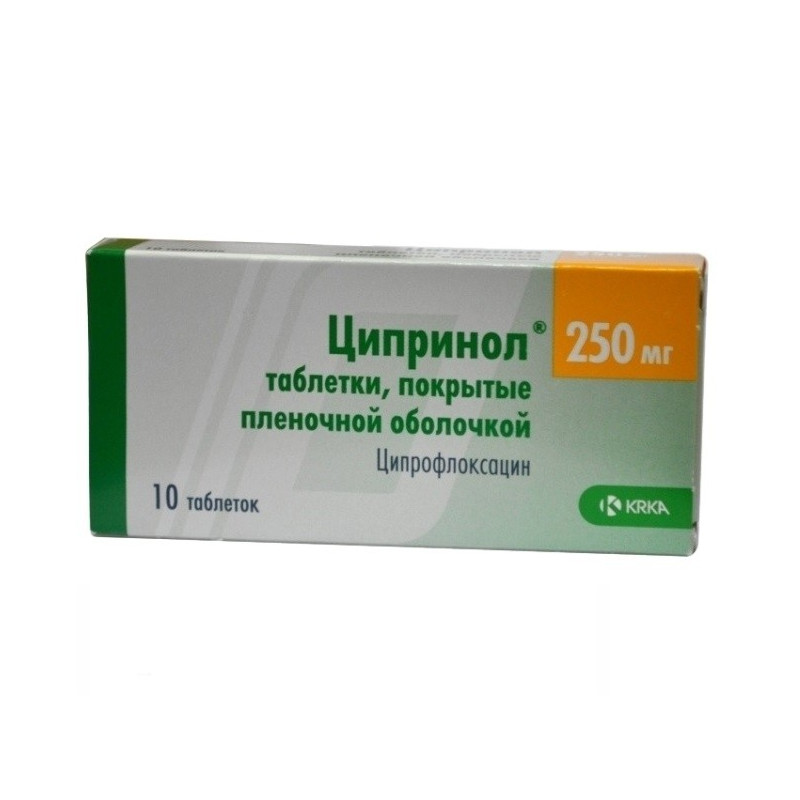



 All payments are encrypted via SSL
All payments are encrypted via SSL
 Full Refund if you haven't received your order
Full Refund if you haven't received your order
Ziprinol - film-coated tablets:
1 tab. contains Ciprofloxacin hydrochloride monohydrate 291 and 750 mg, excipients: MCC; sodium carboxymethyl starch (type A); Povidone; croscarmellose sodium; colloidal silicon dioxide; Magnesium stearate;
Pack of 10 and 20 pcs; Ziprinol - concentrate for preparing a solution for infusion:
1 amp contains ciprofloxacin 100 mg, excipients: lactic acid; hydrochloric acid concentrated; disodium edetate; water for injections; in 10 ml ampoules; in a pack of cardboard 5 ampoules.
Tsiprinol - solution for infusions:
1 ml contains ciprofloxacin 2 mg, excipients: sodium lactate; sodium chloride; hydrochloric acid; water for injections; in bottles of 50, 100 or 200 ml; in a pack of cardboard 1 bottle.
Tsiprinol has antibacterial, bactericidal action.
Bacterial infections caused by susceptible microorganisms: respiratory diseases - acute and chronic (in the acute stage) bronchitis, pneumonia, bronchiectasis, cystic fibrosis; infections of ENT organs - otitis media, antritis, sinusitis, sinusitis, mastoiditis, tonsillitis, pharyngitis; infections of the kidneys and urinary tract - cystitis,pyelonephritis; infections of the pelvic and genital organs - prostatitis, adnexitis, salpingitis, oophoritis, endometritis, tubular abscess, pelvioperitonitis, gonorrhea, soft chancre, chlamydia; infections of the abdominal cavity - bacterial infections of the gastrointestinal tract, biliary tract, peritonitis, intraperitoneal abscesses, salmonellosis, typhoid fever, campylobacteriosis, yersiniosis, shigellosis, cholera; infections of the skin and soft tissues - infected ulcers, wounds, burns, abscesses, cellulitis; bones and joints - osteomyelitis, septic arthritis; sepsis; infections on the background of immunodeficiency (occurring in the treatment of immunosuppressive drugs or in patients with neutropenia); infection prevention during surgical interventions.
Hypersensitivity to ciprofloxacin or other drugs from the group of fluoroquinolones or any other component of Ziprinol;
pregnancy;
lactation period;
children and adolescents up to 18 years old (except for the treatment of complications caused by Pseudomonas aeruginosa in children aged 5 to 17 years with pulmonary cystic fibrosis, treatment and prevention of anthrax);
concomitant use with tizanidine (risk of pronounced decrease in blood pressure, drowsiness).
The most frequent adverse reactions when taking ciprofloxacin are hypersensitivity reactions (skin rash, erythema and pruritus, swelling of the face), less often photosensitivity, nausea, vomiting, abdominal pain, impaired stool.
Treatment should be discontinued with prolonged diarrhea or symptoms of pseudomembranous colitis.Other undesirable reactions are disorders of the central nervous system (dizziness, headache, sensory and anxiety disorders, convulsions, increased intracranial pressure, toxic psychosis and hallucinations). Anaphylactoid reactions and eosinophilia are extremely rare.
Cardiovascular: hypo-or hypertension, seizures, paroxysmal tachycardia.
Other adverse reactions: joint and muscle pain, local reactions at the injection site, crystalluria.
Ciprofloxacin may affect some laboratory parameters: first of all, patients with impaired liver function may temporarily increase the level of transaminases and alkaline phosphatase; and the concentration of urea, creatinine and serum bilirubin.
Tsiprinol is applied inside, in /.
On an empty stomach, swallowing whole, washed down with enough liquid.
0.25 g 2-3 times a day; with severe infection - 0.5-0.75 g 2 times a day (every 12 hours).
The dosage regimen of Ziprinol is determined individually, depending on the severity of the disease, the type of infection, the condition of the body, age, body weight, and the kidney function of the patient.
Reception of Tsiprinol should begin immediately after the alleged or confirmed infection. At the beginning of treatment, the use of parenteral forms is recommended. The total duration of therapy is 60 days.
The duration of treatment depends on the severity of the disease,but treatment should always continue for at least 3 more days after normalization of temperature. Usually the duration of treatment is 7-10 days.
In the dark place at a temperature of 15-25 ° C. Shelf life - 5 years.
